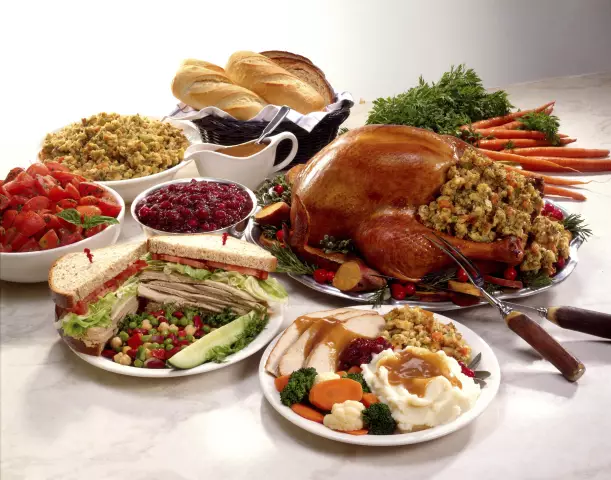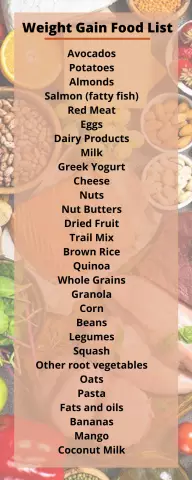- Author Rachel Wainwright wainwright@abchealthonline.com.
- Public 2023-12-15 07:39.
- Last modified 2025-11-02 20:14.
Nutrition for weight gain
Eating for weight gain cannot be compared to the mindless consumption of the most high-calorie foods. Nutritionists advise to competently approach the set of extra pounds so that they do not suddenly become superfluous.
When is weight gain necessary?

More often people are concerned about the problem of excess weight, they are struggling with it using special diets, physical activity, or all together. But there are situations when body weight is low and it is required for one reason or another to make up for the deficit in kilograms.
Nutrition for weight gain is especially important for very emaciated people, after debilitating diseases, in sports for building muscle mass, and also with insufficient weight gain in pregnant women. Asthenic body type is largely determined genetically. Some people want to get better due to the fact that they do not like their thin appearance.
Perhaps excessive thinness is associated with diseases of the endocrine system or the digestive tract. In this case, you need to seek help from an endocrinologist or gastroenterologist.
Useful or harmful pounds?
It does not matter for the body, due to which tissue the deficit in body weight is replenished. If this is due to an increase in adipose tissue, then for the body it is unambiguous harm. Excess fat deposits impede the work of internal organs and interfere with active movement.
Eating for mass gains can accelerate muscle development, and is much healthier than body fat. Muscles are a protective corset for the musculoskeletal system, they help a person to live actively and easily endure various physical activities. In addition, the muscle definition gives the body an athletic beauty and slimness. Some people, especially athletes, specifically modify their diet to gain weight from muscle tissue. This allows you to compete in the next weight category.
How to choose food for weight gain
It is better that a nutritionist has developed a diet for gaining mass. You can do it yourself, but first then you should carefully analyze your daily menu. It is extremely difficult to do this without a food diary, so it is better to allocate a special notebook for recording everything eaten during the day. A feature of this diary will not be counting calories, but an analysis of what was eaten from food and the reasons that prompted you to eat these dishes.
In building the right nutrition for body weight, in no case should you go from the opposite and include only sweets and fatty dishes in your diet.
Nutrition for weight gain must certainly be high in calories, but mainly due to the protein it contains. Protein is the main building block for cells in the body, a source of amino acids, and it is he who increases muscle mass and weight. When in the daily diet for body weight the calorie content will be 200 more calories, then in a year you can expect an increase in your own weight by 8-12 kg.
When protein is broken down, essential (8) and nonessential (12) amino acids are formed, which are part of many enzymes, the body's own proteins. It is important that in the diet for weight gain there must be complete proteins, that is, those that contain both nonessential and essential amino acids. It is known that all plant proteins are deficient, including protein from mushrooms and soybeans. Complete proteins in the diet for weight gain include:
- Eggs;
- Meat;
- Fish;
- Milk and dairy products;
- A bird.
The value of protein in nutrition for weight gain is determined by the proximity of its amino acid composition to the set of amino acids in humans.
Nutrition for body weight: the body's need for protein

Proteins are the main building blocks, and the need for them decreases with age. It is also known that some external and environmental factors can increase the body's need for proteins. There is also a difference in gender - in women, muscle mass is less developed, therefore, the need for proteins is less.
The average adult needs 80 to 100 grams of protein per day. To gain weight, a man's diet should be at least 0.8 g / kg / day. squirrel.
The distribution of the main nutrients in the nutritional menu for weight gain should be within 12% for proteins, 58% for fats and 30% for carbohydrates.
Foods Recommended for Gaining Mass
To gain weight, foods should be selected from the following list:
- Skimmed milk;
- Low-fat types of cheese;
- Lean meat and fish;
- Legumes;
- Fresh vegetables and fruits;
- Juices;
- Rye bread;
- Rice and lentils;
- Sunflower seeds;
- Salad.
Found a mistake in the text? Select it and press Ctrl + Enter.






